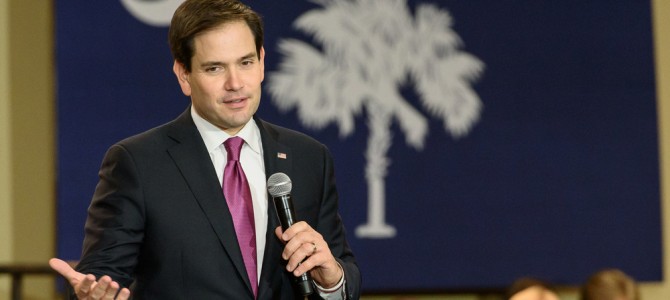Saturday’s margin was rice-noodle thin between U.S senators Marco Rubio and Ted Cruz in the South Carolina GOP primary, and it may finally prove the power of prayer.
Rubio beat Cruz by barely more than 1,000 votes of close to 750,000 votes cast. In percentage terms, bilious billionaire Donald Trump got 32.5 percent of the vote, Rubio 22.5, Cruz 22.3, Jeb Bush 7.8, etc. The difference between the two battling freshman senators came down to late-deciding voters. Those wavering folks broke for Rubio and Cruz and against Trump, but slightly more for Rubio.
According to Edison’s exit polling, if the primary had been decided based upon voters who decided in the final week, the results would have been only 17 percent for Trump, 26 percent for Cruz, 28 percent for Rubio.
Going Negative May Have Hurt Cruz
One might speculate on a number of reasons for Rubio’s edge over Cruz. The Texan’s campaign and associated Super PACs ran millions of dollars in negative ads and pre-recorded “robocalls” against Trump. That drove down Trump’s numbers among late-breakers, but it also hurt Cruz’s image with voters. He didn’t manage to carry a single county. Rubio won two while Trump won everything else and may well walk away with all the state’s delegates for the Republican National Convention.
The effect was similar to New Jersey Gov. Chris Christie’s brutally effective debate drubbing of Rubio in New Hampshire. Christie wounded the Rubio campaign badly with his prosecutorial prodding in one painful-to-watch debate by subjecting Rubio’s robotic talking points to some vigorous questioning. He did not pass the Turing Test that night.
Rubio apologized to his supporters for an embarrassing fifth-place finish in New Hampshire and swore it would never happen again. Yet the achievement proved a consolation prize only for sixth-place Christie, whose campaign didn’t make it to South Carolina.
Jeb Dropping May Boost…Trump
This time the musical chair eliminated Jeb, who announced he was suspending his campaign after a fourth-place finish. In a rational universe, that would help Rubio going forward. After all, both candidates have been associated with some sort of amnesty for the millions of Hispanic immigrants living in the country without legal sanction. Both advocate a hawkish, neoconservative-flavored foreign policy aimed at resisting both disfavored strongmen and stamping out radical Islam, however that is defined.
However, the Jeb-to-Marco express may not take off. Early polling indicated that the biggest overlap of would-be primary voters was between Bush and Trump supporters. No, that wasn’t a typo, and it still may make sense in the weird pretzel logic of political preferences.
In South Carolina, Cruz won a plurality (35 percent) of voters who describe themselves as “very conservative.” Self-described “somewhat conservative” and “moderate” voters went for Trump (35 and 34 percent, respectively). Those were also the groups Bush did better with.
A Wing and a Prayer
The only reason we’re likely even talking about a Rubio second-place finish had to do with one supporter stricken with an affliction at his last rally on Friday night. Rubio paused, then curtailed his speech to deal with the medical problem, which has become an all-too-common occurrence this political season. The other week, Vermont Socialist Democrat Bernie Sanders came to the aid of one supporter who was “feeling the Bern” a little too hard. But Rubio went one step further. He called for a doctor, then added, “Why don’t we just bow our heads for a moment in prayer?”
“Father, Lord, we thank you for bringing us here together tonight,” Rubio hosannaed. He implored God to “put your hand upon him” and reminded the Almighty, “God, all things are possible for you. Lord, you can do everything.” He continued, “We ask you now that your spirit may come upon this place and provide assistance to this gentleman, at this key moment,” insisted that someone with medical training might be able to provide said assistance until the ambulance arrived, and gave the crowd specific traffic instructions for how to help the medics get in and out faster.
A cynic would point out that it was also a key moment for Rubio’s long campaign for the White House, yet there didn’t seem anything cynical about the moment. Unlike so much of the senator’s shtick, the prayer wasn’t certain or arrogant. It wasn’t robotic or scripted. It wasn’t aimed picking fights or jostling for position. It was about bodily wholeness and peace and pulling together to help a guy out—and other wooly-headed inspirational notions.
Rubio’s prayer was an expression of deep yearnings that even the non-religious ought to be able to connect with: the hope that somehow things might bank right for us; the assurance that others are pulling for us; that real chance that we can get through this, together, with a little help from the Man Upstairs or the Universe or perhaps just better luck.
Was that prayer enough to sway 1,000 or so voters in the Southern, quite religious state to back Rubio over Cruz the next day? The Magic 8-Ball says, “It is certain.” As to whether Rubio can build on that victory by truly learning from it, the dark, spherical oracle cautions, “Don’t count on it,” then “Ask again later.”









